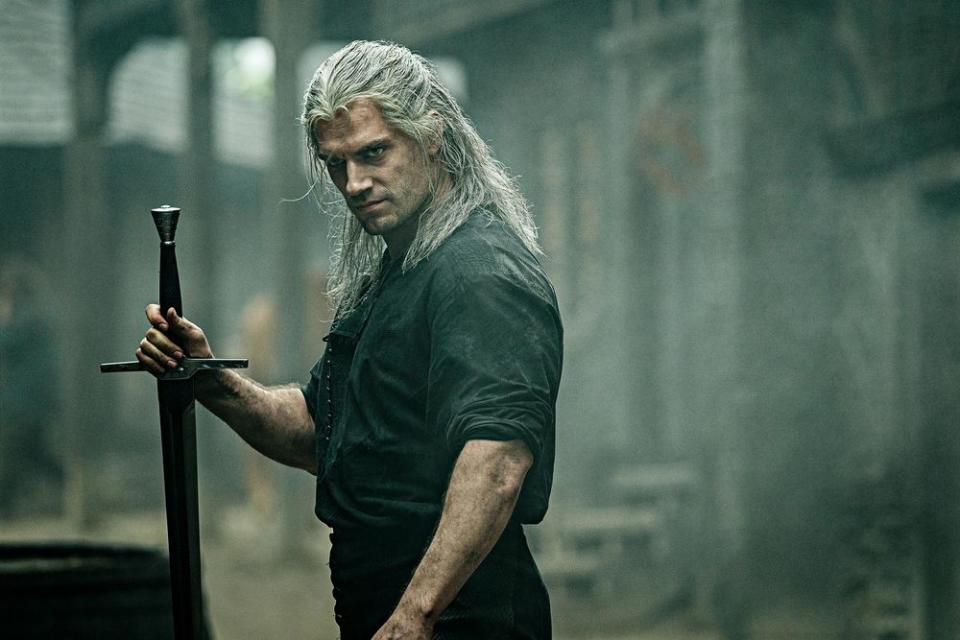Netflix's The Witcher is nakedly terrible: Review

Darren Franich was planning to review the new Netflix series The Witcher by himself. Then he watched half an hour of the premiere and begged his critical colleague Kristen Baldwin to join his quest. The results were not pretty.
KRISTEN: I don’t know, should we start with the wig? The two most important things Hollywood learned from the Lord of the Rings films are as follows: 1) It is possible to make an entire movie franchise about people walking, and 2) If you cast a hunk as a gentle-hearted fantasy-realm hero, make sure to put him in a white-blonde wig that looks like it was snatched straight from the head of Jennifer Elise Cox in The Brady Bunch Movie. And so poor, beefy Henry Cavill — who stars as Geralt of Rivia, the titular Witcher — finds himself saddled with a flowing, distracting mane of flaxen locks.
His hair is definitely the brightest thing about The Witcher’s first episode, which takes place in the dreary, muddy, soot-colored town of Blaviken. It’s a place where people don’t cotton to Witchers, at least if the grimy, bearded man Geralt encounters in the pub is to be believed. “We don’t want your kind around here, Witcher,” he growls. Rude. Anyhow, the pilot also features two rough-and-tumble princesses (Freya Allan, Emma Appleton), a wizard (Lars Mikkelsen), and totally gratuitous full-frontal female nudity. There are seven naked women in the first episode alone, Darren. Seven! I… think I’ve seen enough?

DARREN: Kristen, I have a confession. I am a member of the Henry Cavill Appreciation Society. The big Super-Brit was a deadpan delight in the goofball spyfest The Man From U.N.C.L.E. and a brilliantly looming tower in the most recent Mission: Impossible. Why, oh why, oh why he opted to star in a series that buries him under a bad wig and worse color contacts is a mystery to me.
Or maybe it’s a failure of franchise-chasing. The Witcher comes from novels by Andrzej Sapkowski, which also inspired an acclaimed video game series. I haven’t played the games, but the pilot has certain tropes from that medium exported without imagination to television. There’s the constant download of fantasy verbiage, including much talk about a “kikimora” and a town I swear is called “Blevicum.” Mikkelsen’s character has a big line about how Geralt “made a choice,” which feels like a hat-tip to the open-world nature of the games. The intention here is dark pulp fantasy, so this is the kind of show where a character like Appleton’s Renfri is a Princess and a mutant who has sex with Geralt the night before they battle to the death.
I’m definitely not averse to the wild extremes of this genre — shout-out to the visceral blood terrors of Adult Swim’s Primal — but the first episode felt like cheese gone moldy. That nude bordello really edged the whole vibe in a fratty direction, and the long running time required a lot of take-forever talk about prophecies and destiny. Did you watch further into the season?
KRISTEN: In the interest of professional obligation, Darren, I did sit through the second episode, which was notable for a few reasons. (Spoiler: None of those reasons include, “Because it was good.”) Henry Cavill gets far less screen time in the second hour — and he has to share his few scenes with a very, very annoying traveling bard (I would name the actor who plays him, but I’m fairly certain the writers didn’t even bother to name the character?). Anyhow, this very annoying traveling singer makes up tunes about abortion and says things like, “There I go again, just delivering exposition.”
Most of the second episode is devoted to the travails of a deformed young woman named Yennefer (Anya Chalotra), whose jerk of a father sells her off to a haughty witch named Tissaia de Vries (MyAnna Buring). It turns out Yennefer has some untapped magical abilities, and she finds herself enrolled in Tissaia’s School of Witchcraft and Wizardry, or whatever she calls it. So now this show is The Magicians featuring special guest star Henry Cavill, I guess?
The Witcher is also packed with confusing conflicts and long-held rivalries that require a lot of explanation but still manage to make no sense. The premiere sets up a princess-wizard showdown that is related to a curse (I think), while episode 2 introduces a budding war between Elves and humans. Apparently the Elves taught the humans how to turn something called “chaos” into magic, and then the humans unleashed a genocide on them. “I was once Filavandrel of the Silver Towers,” notes a majestic Elf (Tom Canton). “Now I’m Filavandrel of the edge of the world.” So yeah, this is some high-school level Dungeons & Dragons role play with a multi-million-dollar budget. Netflix canceled the far cheaper, far more entertaining The Good Cop for this?
DARREN: Because life’s too short for Netflix drama running times, I skipped ahead to the fifth episode, which brings the Yennefer and Geralt plotlines together. Episode 5 also features Magic Viagra and a masked orgy set to some truly ridiculous retro-softcore music. I do think there’s room for a mature-content fantasy romp in our post-Game of Thrones universe, but eternal exposition runs alongside a tin ear for dialogue.
This is the first TV show I’ve ever seen that would actually be better with commercial breaks. The goofy syndicated fantasy of yesteryear had to have a brisk pace, building every 12 minutes to an act-breaking cliffhanger. The Witcher fully embraces the endless-movie layout of the worst Blank Check streaming TV. At the end of the series premiere, someone tells Allen’s Princess Ciri that Geralt is her destiny. In episode 5, people are still telling her that Geralt is her destiny. I assume they will meet in the season finale. Alas, my destiny is to never watch this borefest ever again. Grade: F
Related content:

